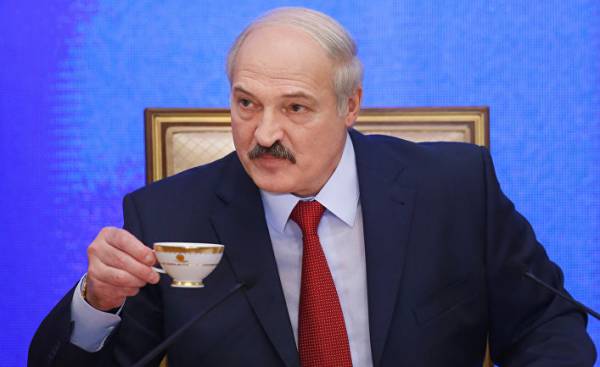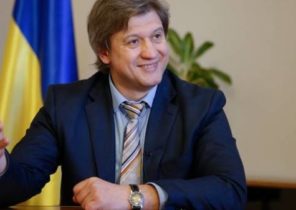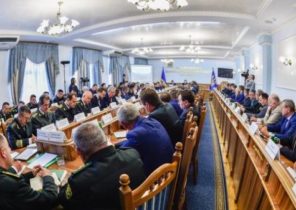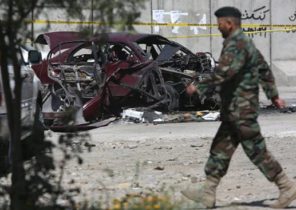
After the change of power in Ukraine, Belarus is trying to hide from the tensions between Russia and the European Union. Presenting himself as a mediator, the Minsk expects to diversify relations and to approve independence in relation to Moscow. Whatever it was seeking to retain power and strategic partnership, President Lukashenko understands which red lines cannot be crossed.
In the spring of 2014 annexation of Crimea by Moscow and its military intervention in Eastern Ukraine has noticeably cooled the close bilateral relations of Belarus with neighboring Russia. “The Ukrainian events have demonstrated Moscow’s willingness for a military intervention and destroyed the Soviet myth of fraternal Russian, Ukrainian and Belarusian peoples,” says journalist and expert on defence matters Alexander Alesin. Since then, the President of Belarus Alexander Lukashenko is trying to distance himself from the Kremlin, not create that impression that puts thus, under the impact of his interests.
Lukashenka is not going to ruin the foundations of the strategic Alliance, which was formed after his election as President of this former Soviet Republic in July 1994. Relations are based on the Union state of Russia and Belarus (form 8 December 1997) and a number of international agreements: Commonwealth of independent States (December 1991), the Organization of collective security Treaty (2002), the Eurasian economic Union (January 1, 2015).
Russia is the main trading partner of Belarus (26.1 billion in 2016, compared to 6.5 billion in 1996) and provided massive subsidies to its economy in the form of stabilization credits and feed-in tariffs for hydrocarbons. The amount of these subsidies exceeded $ 80 billion between 2002 and 2015. In addition, Minsk and Moscow have formed a strategic partnership in the military sphere with the formation of a regional army group in 1999, and the common air defense system in 2011. Since 1995, both countries share two located on the territory of Belarus military objects.
Anyway, the Ukrainian crisis led to the loss of Minsk, the credibility of its “big brother”. Adopted in July 2016, the military doctrine indicates (without explicit names) that Russia and the Western powers (Lukashenko accuses of preparing a “color revolution”) are neighbours who are able to conduct asymmetrical military operations against the country. The document notes the operations that resemble Russia’s intervention in Eastern Ukraine: scheduled third States as terrorist or extremist armed groups, destabilization for forming the country’s armed conflict, the information war. In addition, Minsk is trying to increase efficiency to combat the revolts of units in the internal security and the army. The scenario of the exercise, which took place in September 2016 in the Vitebsk region, reminiscent of the events of spring 2014 in the Donbass (especially in the storming of government departments in Slavyansk and Kramatorsk armed groups under the command of Igor strelkov). Numbering a total of 8 thousand employees of special forces, regardless of their affiliation, were under the command of the eldest son of President Viktor Lukashenko, who has held the post of national security adviser. Besides, additional forces of the territorial defence and 120 thousand reservists may also be involved in case of in the country of conflict as a result of actions of foreign powers, that is, operations against insurgents and terrorists.
In the absence of opportunities to strengthen the Russian-Belarusian border, which the citizens of both countries can cross without a visa, as a simple administrative Rubezh, Minsk introduced in September 2014, the regime of the border area: he suggests strengthening border controls, but these measures did not continue to practice out of fear to provoke the neighbor.
The Belarusian government also embarked on the demarcation and arrangement of 1 084 thousand kilometers (rather leaky) borders with Ukraine, to prevent the spread of violence, and the movement of fighters and weapons. To date, it has 350 kilometers of the border with new posts, and also created a new team with several mobile groups of border guards. In February 2016, the participation in military operations abroad outside the Belarusian army became punishable by five years in prison. In the spring of that year, the Belarus Ministry of internal Affairs brought charges against 138 citizens who participated in the fighting in the Donbass on both sides of the front.
The government is also concerned about the dominance of Russian media in the country. In may 2016, the Deputy head of the presidential administration Igor Buzovsky said that the Russian channels and programs (they account for 65% of screen time in the country) have raised concerns from the point of view of national culture and information security. Anxiety manifests itself the more that the government often becomes the target of information attacks. In November of 2016 “the First channel” and “Zvezda” (Russian defense Ministry) devoted to Belarus, the talk show, which was cool, slipping the anti-Russian nationalism, like Ukraine.
Anyway, the censorship against these programs that reflect the concerns of the Russian leadership about the autonomy of Belarus, is a red line that Minsk is not ready to cross. The regime is trying in roundabout ways to strengthen national identity in a country where after two decades of active Russification, more than 80% of the population speak fluent Russian. In July 2016, responsible for socio-political education of the young generation of Belarusian Republican youth Union held at the initiative of the authorities of the day “vyshyvankas” (traditional embroidered shirts in red and white).
The end of the European stigma
In the quest for autonomy Minsk is trying to normalize relations with Brussels. In the framework of the Ukrainian crisis, he identified himself as an essential intermediary in the settlement of the armed conflict in the Donbass. The events in Ukraine also changed the policy of the European Union towards Lukashenka’s regime, if earlier it revolved around the values of democracy and human rights and reinforced by the sanctions, and now she refocused on the interests of the member countries and in particular on the issue of security and stability at the borders.
All of these changes, as well as gestures of openness of the Belarusian regime has pushed the EU to remove 15 Feb 2016 170 sanctions against Belarusian citizens and three private and state enterprises. International ostracism of the country was formed in the early 2000s, years after Lukashenka’s refusal to comply with the requirement to hold free elections and respect for human rights. Anyway, the sanctions against the four responsible for the disappearance of people in 1999-2000, and an embargo on the supply of weapons and equipment that can be used for repression, was upheld.
Since then, the Brussels and Minsk have a dialogue, which is limited to economy (improving business climate), trade (reduction of import barriers for Belarusian goods in the EU), financial (assistance in obtaining a loan from the IMF) and technology (the introduction of European technical regulations, green economy, modernisation of the transport infrastructure). Apparently, this dialogue helps Belarus to maintain stability and even to compensate for the decline in direct and indirect assistance from Russia.
13 Oct 2016 Minsk and the EU signed an agreement on “partnership in the area of mobility”, which is intended to facilitate the movement of people, creating at the same time, barriers to illegal migration and smuggling. It complements the agreement on easing the visa regime, which is discussed since January 2014 (the signing was postponed only for technical reasons). After the entry into force of the agreement will facilitate the border crossing and will reduce the cost of Schengen visas for the Belarusians have to pay 60 euros (for the Russians, they are 35). An important measure for a country that leads in the number of issued Schengen visas per capita (752 782 thousand in 2015).
Although these unprecedented progress in relations with Brussels are pushing the regime towards greater openness, the authoritarian Lukashenko prevents the signing of the agreement on partnership and cooperation, which is pressing for Minsk. Belarus remains the only continent country without membership in the Council of Europe (is a candidate since 1993), but with the retention of the death penalty. President Lukashenko does not want to remove existing since the beginning of 2000-ies of the limitations of political and civil liberties out of fear that it might undermine his power.
After the relative restraint against the opposition demonstrators in 2016 and in March 2017, the regime again used force to suppress the protests against the tax in almost 200 euros for “parasitism”, i.e. the lack of the official workplace for over six months. Prohibited on March 25 demonstration in Minsk were detained 700 people: 144 of them were sentenced to fines of several hundred euros or imprisonment for a term of 5 to 25 days. About 20 former activists of the nationalist movements of the 1990s, years even prosecuted for Subversion. The relative silence of the European Union about this repression demonstrates its reluctance to criticize the regime out of fear that he might again withdraw and turn exclusively toward Russia.
This attempt to rethink the foreign policy of Belarus has complicated the dialogue with Moscow on strategic and even economic issues. The differences primarily manifested in the deployment of Lida in the Grodno region of the Russian fighter regiment within the overall air defense system. This question was first raised in 2012, and then again came to the fore in the fall of 2015, when the country was in the full swing of the presidential campaign and Minsk has sought to achieve a partial lifting of the European sanctions. Russian media announced the deployment of fighters in Belarus from 1 January 2016. President Lukashenko said that his country is not going to accept a Russian military base on its territory.
This initiative is not concerned with the reaction of Minsk in Moscow was a response to the NATO deployment of new divisions in the Baltic States and missile defense system (based on American technology) in Central Europe. In may 2016 was put into operation the object of missile defense in Romania, and in Poland and the Czech Republic should receive the other elements of the system such as interceptor missiles and radars. In addition, Russia has sought closer control over the obstinate Belarusian partner: the desire of Lukashenka to neutrality in the confrontation between Moscow and the West, as well as freedom of maneuver in relation to the neighbor will be finally undermined by the emergence of a military base on its territory. Even worse, given the situation of the country as a “buffer zone” between Russia and NATO, it could become a platform for more direct confrontation. This is just more fear in Belarus, which has lost 25% of the population during the Second world war.
Finally, the adverse economic consequences of the Ukrainian crisis for both countries strengthened nationalist sentiment and led to new trade wars in 2016. First of all, the tension jumped in the supply of Russian gas to Belarus. In response to the refusal of Gazprom to make concessions on price Minsk has unilaterally decided to pay him 73 dollars per 1 thousand cubic meters instead of 132. Moscow said the reduction of the concessional supply of oil (18 million tons instead of the planned 24), which was a heavy blow for the Belarusian petrochemical industry, production of which is one third of total exports of the country.
Another indicator of the friction factor was imports to Russia via Belarus of foodstuffs from the EU, which are under embargo on August 6, 2014. The current in the Eurasian economic Union regulations permit the re-export of these products (cheese, fruits and vegetables, fish and seafood) from Belarus, provided that they have been treated or processed in its territory. Many local manufacturers are now actively using this filing with the authorities. According to the Russian Prosecutor’s office, Belarus exported in 2015, up to five times more apples and mushrooms, than made. In October 2016, the sanitary service has accused the Belarus that the re-exported nearly 100 thousand liters of Polish milk, thus bypassing the embargo. Russia in its turn trying unilaterally to toughen rules of import of Belarusian goods (milk, cheese, meat), including by introducing a temporary embargo.
Anyway, all this tension does not promise a serious review of the relations: mutual dependence in strategic and economic terms is too strong. Yet Russia’s interests in Belarus, out of danger, she refrains from too much pressure on partner. And let the financial assistance of Moscow has decreased in comparison with 2000 years, it is still substantial: $ 12 billion over several years from the Eurasian development Bank, promised in 2017 a billion dollars to repay the debt for gas deliveries in 2016. In addition, after April 3, 2017 bilateral summit in Moscow eventually agreed to give the neighbor a discount on gas in 2018 and 2019, Minsk will have to pay 129 and 127 dollars for 1 thousand cubic meters instead of the originally planned $ 150.
Belarus is not going to openly challenge the status of Russia as a key partner though and keeps the neutrality in the Ukrainian crisis and confrontation between Russia and NATO. In any case, in the fall of 2017, the country will hold joint military exercises “Zapad”, as restored in 1999, the Soviet strategic tradition.
Neutrality Lukashenko and his desire for greater independence reflect a strategy of maintaining the regime. In the current environment it implies the assertion of the sovereignty of Belarus, more balanced foreign policy and even some openness. In addition, she receives a response among the population that wants to distance itself from the conflict between two giants: in the summer of 2016, 58% of respondents said they wish to stay away from confrontation between Russia and NATO.







